Published on June 5, 2013
“The recently released 2012 Country Report on Terrorism repeats the U.S. State Department’s assertion, “The Democratic People’s Republic of Korea (DPRK) is not known to have sponsored any terrorist acts since the bombing of a Korean Airlines flight in 1987.” Perhaps the report’s drafters should have checked with the President before they made this indefensible claim. In 2005, then-Senator Barack Obama expressed a decidedly different view of Pyongyang’s terrorist activities.” ~ Dennis P. Halpin
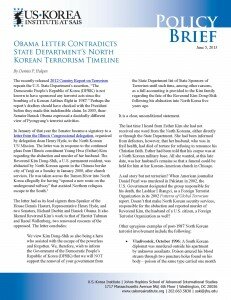 In response to the recently released 2012 Country Report on Terrorism, Dennis P. Halpin, former House Foreign Relations Committee staff member and current Visiting Scholar at the US-Korea Institute at SAIS, challenges the report’s characterization of North Korea’s record on terrorism and the sponsorship of terrorism. In this policy brief, Halpin offers eight examples that could be construed as contradictory to the report’s findings, including a high-profile case endorsed by President Obama himself (then Illinois Senator) as recently as 2005.
In response to the recently released 2012 Country Report on Terrorism, Dennis P. Halpin, former House Foreign Relations Committee staff member and current Visiting Scholar at the US-Korea Institute at SAIS, challenges the report’s characterization of North Korea’s record on terrorism and the sponsorship of terrorism. In this policy brief, Halpin offers eight examples that could be construed as contradictory to the report’s findings, including a high-profile case endorsed by President Obama himself (then Illinois Senator) as recently as 2005.
Download USKI Policy Brief “Obama Letter Contradicts State Department’s North Korean Terrorism Timeline” by Dennis P. Halpin.
Dennis P. Halpin is currently a visiting scholar at the U.S.-Korea Institute at Johns Hopkins School of Advanced International Studies (SAIS). He served as a Peace Corps volunteer in South Korea, U.S. consul in Pusan, and a House Foreign Affairs Committee staff member for over twelve years.
Published on May 29, 2013
“I explained that Americans expected Beijing, a communist dictatorship, neither to understand nor appreciate our Bill of Rights. But it is far more disturbing that an American ally, who aspires to the same democratic values that we do, would demonstrate such a lack of understanding.” ~ Dennis P. Halpin
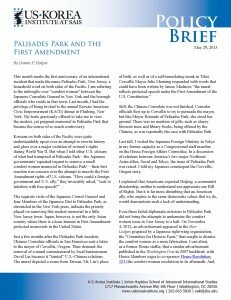 In 2010, the community of Palisades Park, New Jersey dedicated a small memorial to the memory of the “comfort women,” the tens of thousands of women, many of whom were Korean, who were forced into sexual slavery by Japanese military during World War II. In May 2012, the Japanese government sent two delegations of Japanese officials to Palisades Park to implore the local government to remove the memorial; their efforts were unsuccessful and have thus, inspired other Korean communities across the United States to erect similar memorials.
In 2010, the community of Palisades Park, New Jersey dedicated a small memorial to the memory of the “comfort women,” the tens of thousands of women, many of whom were Korean, who were forced into sexual slavery by Japanese military during World War II. In May 2012, the Japanese government sent two delegations of Japanese officials to Palisades Park to implore the local government to remove the memorial; their efforts were unsuccessful and have thus, inspired other Korean communities across the United States to erect similar memorials.
On the first anniversary of this international incident, Dennis P. Halpin, former House Foreign Relations Committee staff member and current Visiting Scholar at the US-Korea Institute at SAIS, discusses discusses why the Japanese government’s efforts, beyond being ineffective, were unconstitutional and should not be repeated. Download USKI Policy Brief “Palisades Park and the First Amendment,” by Dennis P. Halpin.
Dennis P. Halpin is currently a visiting scholar at the U.S.-Korea Institute at Johns Hopkins School of Advanced International Studies (SAIS). He served as a Peace Corps volunteer in South Korea, U.S. consul in Pusan, and a House Foreign Affairs Committee staff member for over twelve years.
Published on December 14, 2012
USKI’s Joel Wit and Jenny Town published an article on ForeignPolicy.com discussing what the successful North Korean rocket launch means for US foreign policy towards the DPRK. The Obama administration now faces the choice of how his record on North Korea will be remembered: a hard problem more or less contained or a rogue state armed with dozens of nuclear weapons well on its way to threatening the US. Obama’s second term is a second chance to tackle this important foreign policy issue. Is he up to the challenge?
Read the article “Launch This” at ForeignPolicy.com.
Joel Wit is a visiting scholar at the U.S.-Korea Institute at Johns Hopkins School of Advanced International Studies and founder of its North Korea website, 38 North. Jenny Town is a research associate at the U.S.-Korea Institute at Johns Hopkins School of Advanced International Studies and editor of 38 North.
Published on November 14, 2012
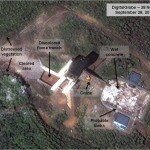 While the North Koreans may have refrained from conducting a nuclear test and subsequent missile tests after their failed rocket launch in April 2012, recent satellite imagery shows that the North is still continuing development of their missile development and the launch pad at the Sohae Satellite Launching Station (Tongchang-ri). USKI’s 38 North was the first to report on these developments, analyzing imagery from DigitalGlobe. According to 38 North analysts, the North has conducted liquid-fueled rocket engine tests at the Sohae facility as recently as September, and has continuing improvements to the Sohae launch pad. Full analysis and satellite imagery can be found here: http://38north.org/2012/11/sohae111212/.
While the North Koreans may have refrained from conducting a nuclear test and subsequent missile tests after their failed rocket launch in April 2012, recent satellite imagery shows that the North is still continuing development of their missile development and the launch pad at the Sohae Satellite Launching Station (Tongchang-ri). USKI’s 38 North was the first to report on these developments, analyzing imagery from DigitalGlobe. According to 38 North analysts, the North has conducted liquid-fueled rocket engine tests at the Sohae facility as recently as September, and has continuing improvements to the Sohae launch pad. Full analysis and satellite imagery can be found here: http://38north.org/2012/11/sohae111212/.
Just after Barack Obama was re-elected to a second term as President of the United States and just a month before a hotly contested presidential race in South Korea, the developments at Sohae have reminded both candidates of why North Korea policy coordination in these new adminstrations is important and of the potential for provocations at the outset of the two Presidents’ terms.
See CNN coverage of the 38 North article here: http://www.cnn.com/video/#/video/world/2012/11/14/clancy-nkorea-rocket-test.cnn.
Published on January 29, 2012
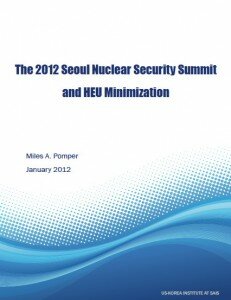 The US-Korea Institute at SAIS launches a new paper series focused on issues to be addressed at the upcoming Nuclear Security Summit in Seoul.
The US-Korea Institute at SAIS launches a new paper series focused on issues to be addressed at the upcoming Nuclear Security Summit in Seoul.
The first paper in this series examines the status of HEU minimization efforts and offers strategies for how to continue these efforts into the future. Find out more here.
Published on November 20, 2011
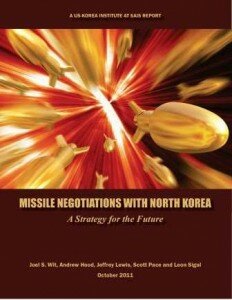 While public attention has been focused on restarting denuclearization talks with North Korea, an important component of any renewed dialogue with Pyongyang will be controlling its ballistic missile program. That effort has been moving gradually but steadily ahead since the North ended its unilateral test moratorium in 2006 with the further development of threatening technologies, as well as the deployment of new models. Secretary of Defense Robert Gates recently highlighted the dangers posed by this effort during his January trip to Asia. He stated, “With the North Koreans’ continuing development of nuclear weapons and their development of intercontinental ballistic missiles, North Korea is becoming a direct threat to the United States, and we have to take that into account.” growing nuclear weapons stockpile and increasingly capable delivery systems will pose a serious danger to the region, and eventually perhaps even to the United States. In short, if the Six Party Talks resume, a high priority for the United States will be to also start negotiations that cover missiles.
While public attention has been focused on restarting denuclearization talks with North Korea, an important component of any renewed dialogue with Pyongyang will be controlling its ballistic missile program. That effort has been moving gradually but steadily ahead since the North ended its unilateral test moratorium in 2006 with the further development of threatening technologies, as well as the deployment of new models. Secretary of Defense Robert Gates recently highlighted the dangers posed by this effort during his January trip to Asia. He stated, “With the North Koreans’ continuing development of nuclear weapons and their development of intercontinental ballistic missiles, North Korea is becoming a direct threat to the United States, and we have to take that into account.” growing nuclear weapons stockpile and increasingly capable delivery systems will pose a serious danger to the region, and eventually perhaps even to the United States. In short, if the Six Party Talks resume, a high priority for the United States will be to also start negotiations that cover missiles.
read more …
Published on May 7, 2011
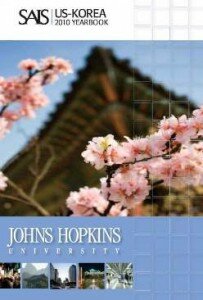 The U.S.-Korea Institute at SAIS is pleased to announce the release of the 2010 Edition of the SAIS U.S.-Korea Yearbook.
The U.S.-Korea Institute at SAIS is pleased to announce the release of the 2010 Edition of the SAIS U.S.-Korea Yearbook.
The Yearbook analyzes important developments in North and South Korea that characterized their relations in 2010. Each paper was written by a SAIS student from the course, “The Two Koreas: Contemporary Research and Record,” in the fall of 2010. Their insights were based on extensive reading and study as well as on numerous interviews conducted with government officials, scholars, NGO workers, academics and private sector experts both in Washington and Seoul.
Explore the 2010 SAIS U.S.-Korea Yearbook.
 In response to the recently released 2012 Country Report on Terrorism, Dennis P. Halpin, former House Foreign Relations Committee staff member and current Visiting Scholar at the US-Korea Institute at SAIS, challenges the report’s characterization of North Korea’s record on terrorism and the sponsorship of terrorism. In this policy brief, Halpin offers eight examples that could be construed as contradictory to the report’s findings, including a high-profile case endorsed by President Obama himself (then Illinois Senator) as recently as 2005.
In response to the recently released 2012 Country Report on Terrorism, Dennis P. Halpin, former House Foreign Relations Committee staff member and current Visiting Scholar at the US-Korea Institute at SAIS, challenges the report’s characterization of North Korea’s record on terrorism and the sponsorship of terrorism. In this policy brief, Halpin offers eight examples that could be construed as contradictory to the report’s findings, including a high-profile case endorsed by President Obama himself (then Illinois Senator) as recently as 2005.

 While the North Koreans may have refrained from conducting a nuclear test and subsequent missile tests after their failed rocket launch in April 2012, recent satellite imagery shows that the North is still continuing development of their missile development and the launch pad at the Sohae Satellite Launching Station (Tongchang-ri). USKI’s 38 North was the first to report on these developments, analyzing imagery from DigitalGlobe. According to 38 North analysts, the North has conducted liquid-fueled rocket engine tests at the Sohae facility as recently as September, and has continuing improvements to the Sohae launch pad. Full analysis and satellite imagery can be found here: http://38north.org/2012/11/sohae111212/.
While the North Koreans may have refrained from conducting a nuclear test and subsequent missile tests after their failed rocket launch in April 2012, recent satellite imagery shows that the North is still continuing development of their missile development and the launch pad at the Sohae Satellite Launching Station (Tongchang-ri). USKI’s 38 North was the first to report on these developments, analyzing imagery from DigitalGlobe. According to 38 North analysts, the North has conducted liquid-fueled rocket engine tests at the Sohae facility as recently as September, and has continuing improvements to the Sohae launch pad. Full analysis and satellite imagery can be found here: http://38north.org/2012/11/sohae111212/.


